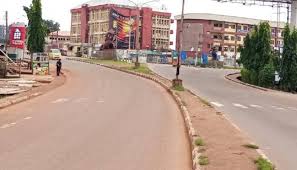Over the past four years, the southeastern region of Nigeria has experienced significant economic and social disruptions due to the Indigenous People of Biafra (IPOB)’s sit-at-home orders. These weekly shutdowns, initially intended to demand the release of IPOB leader Nnamdi Kanu, have escalated into broader calls for the secession of the southeast. The consequences have been far-reaching, affecting various sectors and communities.
According to a report, the southeastern states have incurred an estimated loss of N7.6 trillion over the four-year period. Micro and small businesses bear the brunt, with losses averaging N4.5 trillion annually. Transporters also face daily losses ranging from N10 billion to N13 billion due to halted operations on sit-at-home days. In Enugu, for instance, hotel manager Paschal Ifeanyi reported an 80% drop in revenue on sit-at-home days, from about N1 million to N100,000. Similarly, in Owerri, Imo State, hotels experience a complete halt in patronage, leading to significant financial strain.
The sit-at-home orders have also led to increased insecurity in the region. Over 700 individuals have lost their lives since 2021 due to the enforcement of these orders, including clashes between IPOB members and security forces. The violence has disrupted daily life, with residents often confined to their homes in fear. In May 2024, the situation escalated when three soldiers were killed during a sit-at-home observance in Abia State. The attack led to heightened military presence and further intensified the climate of fear in the region.
Educational institutions have not been spared. Schools frequently close on sit-at-home days, leading to missed classes and exams. In some areas, classes are rescheduled to Saturdays to make up for lost time, disrupting the academic calendar and affecting students’ learning experiences.
Access to healthcare services has also been compromised. In Imo State, many Primary Health Centres (PHCs) remain closed on Mondays, the designated sit-at-home day, leaving residents with limited access to medical care. Private hospitals, such as St. Michael Hospital & Maternity in Okigwe, continue to operate but report a significant decline in patient turnout on these days, as individuals fear potential attacks.
The ongoing insecurity and economic challenges have prompted many southeastern residents to relocate to neighboring regions in search of safety and better opportunities. Cities like Asaba in Delta State have seen an influx of migrants from the southeast, leading to demographic shifts and changes in local economies.
While the initial compliance with the sit-at-home orders was high, recent surveys indicate a decline in public support. Many residents now participate out of fear rather than conviction. A spokesperson for IPOB denied responsibility for the violence, attributing it to kidnappers and criminals recruited by the government to tarnish the group’s image.
The sit-at-home orders imposed by IPOB have had profound effects on the southeastern region of Nigeria. The economic losses, security challenges, educational disruptions, healthcare limitations, and migration trends underscore the need for a comprehensive approach to address the underlying issues. As the situation continues to evolve, it remains crucial for all stakeholders to engage in dialogue and seek sustainable solutions to restore peace and stability to the region.
